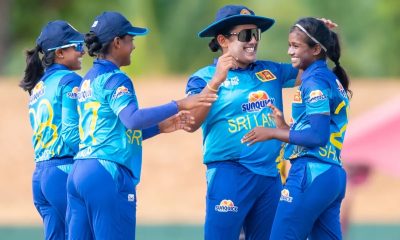Features
Challenges to Pohottuwa in Geneva – I
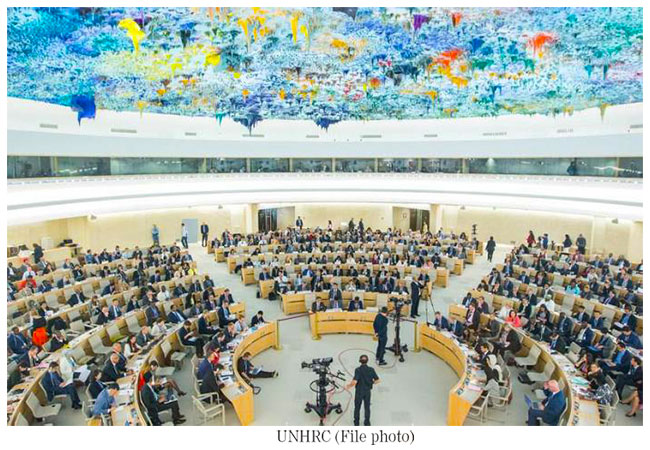
By Austin Fernando
Due to pressure from the European Union, which has, in keeping with UNHRC resolution, in March 2021, decided to consider, the withdrawal of GSP+, action is pursued back home to adopt countermeasures. Justice Minister Ali Sabry has launched a website of the Office of National Unity and Reconciliation, and the Cabinet has approved policies and guidelines for the Office for Reparation, and the government opened an Office of Missing Persons (OMP) in Kilinochchi. Too little, too late!
However, the appointment of an Advisory Board, by President Gotabaya Rajapaksa to recommend and advise as regards what action should be taken in respect of the persons imprisoned or detained over terrorist activities, should be appreciated. Speculation is that some of the detainees may be released soon, as an initial response. The government seems to be softening its stand following the US Ambassador’s lunch with Minister Professor GL Peiris (PGLP) and MP MA Sumanthiran, which has loaded energy to sprint. MP Sumanthiran’s interest for the US to intervene, become the “third faction” (Daily News-.31-8-2021) also shows sprinting from the other end
Complaints that the government is using the Prevention of Terrorism Act to suppress people’s rights, and its alleged interference in judicial decisions will aggravate Sri Lanka’s problems in Geneva.
Commitments to UNHRC
The Government of Sri Lanka (GoSL) committed to Transitional Justice (TJ) by unilaterally placing UNHRC Resolution 11/1 and co-sponsoring Resolution 30/1. These commitments matched the ‘Four Pillars of TJ/ Reconciliation’ – seeking truth, justice, reparation, non-recurrence. Its implementation was:
Establishing the OMP, and the attempt to establish a Truth and Reconciliation Commission (TRC) through Cabinet Memorandum by PM Ranil Wickremesinghe (October 18, 2018), which failed with the ‘Constitutional Coup’ of October 26, 2018.
Study of Accountability Mechanism (AM) by a Working Group during the Yahapalana regime; no legislation was undertaken.
Yahapalana government establishing the Office for Reparation.
The expectation of non-recurrence through Constitution-making failed during the Yahapalanaya, and Pohottuwa looking forward to Romesh de Silva Committee.
The AM seems ‘dead’, though it is the most sought for, and alive among victims, their spokespersons, and internationals. Hence, AM will be addressed to understand its implications.
Accountability Mechanism
In terms of UNHRC Resolution 30/1, GOSL has acknowledged that accountability is essential to uphold the rule of law and build community confidence in the justice system. The GOSL proposed (30/1) to establish a judicial mechanism with a Special Counsel to investigate allegations of violations and abuses of human rights and violations of international humanitarian law. The credible judicial process included independent judicial and prosecutorial institutions and affirmed the importance of participation in a Sri Lankan judicial mechanism, including the Special Counsel’s office, of Commonwealth and other foreign judges, defense lawyers, authorised prosecutors, and investigators.
Yet, the AM has not been put in place by the nationalist Pohottuwa, and the undecided Yahapalanaya governments for political reasons. The victims, politicians, and the Diaspora demanded the AM on humanitarian and political grounds.
The unacceptability of the AM is based on several concerns:
(i) After the war victory, the soldiers deservedly became ‘war heroes. The terrorists who egregiously violated human rights and humanitarian laws were not affected by TJ, due to death, migration, etc. Therefore, a justifiable argument was put forth against prosecuting only military officers. The UNHRC wanted action against every violator.
(ii) Many are those who claim that the AM proposal is an attempt by the Diaspora and LTTE supporters to launch a witch-hunt against the military. We overlooked that our international friends also support accountability, as recently expressed by Lanka-friendly Lord Naseby when inquired (Pathfinder Foundation Zoom Meeting) whether he precluded ‘war crimes investigations’ having quoted the White Flag incident.
(iii) Even a deadlock could happen if the soldiers do not respond to AM summons. Such a situation could bring the military and the judiciary on a collision course. An AM, that is put in place with the ground reality being factored in, will fail.
(iv) There are two schools of thought as regards TJ: the ‘legalists’ and ‘realists.’ The ‘legalists’ argue prioritising judicial accountability to promote sustainable peace. In contrast, ‘realists’ argue for the prioritisation of restorative justice, for example, TRCs or Reparation Offices. Some question the UNHRC’s preoccupation with the ‘legalist’s viewpoint’.
(v) Existing domestic legal provisions conflict with AM implementation.
(vi) Overall, it was politically unsound.
Validation of AMs
Public validation of AM was orchestrated by Prince Zaid Al Hussein, the former UNHRC’s High Commissioner at a press briefing in Colombo. He declared: “Virtually every week provides a new story of a failed investigation, a mob storming a courtroom or another example of a crime going unpunished. Sexual violence and harassment against women and girls are particularly poorly handled by the relevant State institutions — especially when the alleged perpetrators are members of the military or security services — and, as a result, it remains all too widespread.” This had made the UNHRC suggest international participation in AM, he said. The Tamil Diaspora’s and victims’/ spokespersons’ mindsets remain unchanged even today.
Another view was that alleged violators would be hauled before the International Criminal Court. At the briefing, Prince Hussein declared that it was not expected, and difficult, probably knowing our ability to muster a veto at the UN Security Council.
Answering a journalist, Prince Hussein affirmed that the UNHRC wished that any decision-making was the sovereign right of Sri Lankans. He cautioned that whatever the recommendations, we must finally make victims feel that justice had been delivered to them. This balancing act is one of the challenges before PGLP.
As for TJ, no order was given for establishing any institutions. Hence, first establishing the less controversial TRC, OMP, and Reparation Mechanism, allowing the public to understand the non-destructive nature of TJ was preferred. But, for political popularity, the victims’ spokespersons thought differently and demanded AM.
Prince Hussein wished the AM was established according to Sri Lankan laws. Most of the majority community members detested the establishment of AM. The victims called for an AM to severely punish the military personnel, and they ignored the LTTE’s crimes. Some legalists spoke of the potentiality of worst consequences such as universal jurisdiction if TJ is disrespected.
I quote an Attorney justifying an accountability process, as anticipated by the UNHRC. She argued:
(i) A credible accountability process against those most responsible for violations and abuses of human rights and humanitarian laws will safeguard the reputation of those, including within the military, who conducted lawfully.
(ii) An accountability process is essential for non-recurrence, as unredeemed violence is one of the greatest contributory factors for recurrence.
(iii) The only way to prevent recurrence is by combating the causes of conflict, which can be done only through a process that properly addresses past violations.
(iv) The GOSL needs to fulfill its constitutional obligation to investigate and prosecute past crimes. To renege on that will not only taint the credibility of the GOSL in the eyes of the international community, but it will also erode public confidence instilled in the government concerning its commitment to uphold human rights, including combating impunity.” (Sri Lanka’s Time to Try: Editors – Dr. Isabelle Lassee/ Zahabiya Husain [SLTT] Page 135: ‘Dealing with the past’: Prashanthi Mahindaratna)
Her arguments are difficult to counter and were repeated. I quote Attorney Achala Seneviratne: “By punishing real criminals we create an opportunity to prove that we do not favor criminals because they are war heroes. Hiding criminals make the whole military criminals.”
Additionally, Mahindaratna stated the existing legal means. Quote:
“In fact, in terms of the Commissions of Inquiry Act, the Attorney-General is permitted to institute criminal proceedings solely based on the findings of a commission of inquiry appointed under the said Act, and in terms of the Code of Criminal Procedure (CCP), a police officer is required to ‘forthwith’ communicate to the magistrate having jurisdiction, or to his superior, ‘any information which he may have or obtain respecting’ (a) the commission of or attempt to commit any offense; (b) a sudden or unnatural death or death by violence; and (c) recovery of a dead body where the cause of death is unknown. Thus, by law, the police are required to initiate an investigation into an alleged crime upon learning of its commission by whatever means. As such, the oft-repeated justification for inaction that a criminal investigation could be initiated only where there is a formal complaint filed by a complainant is without merit.” (Ibid: Page 122).
Though this validation is acceptable, literature speaks negatively about its operability. Quote:
“While some international observers believe the new government (2015) should be generously afforded the time and space to develop its own mechanisms, the reality is that Sri Lanka’s record of domestic accountability throughout its post-independence history has been characterized by a lack of political will, lack of capacity, political interference, and chronic failure. To expect victims to put their trust in familiar domestic mechanisms that have failed time and again is unfair and unwise.” (SLTT- Page 139: ‘A hybrid court: Ideas for Sri Lanka – Rhadeena de Alwis and Niran Anketell).
The Special Rapporteur on the Independence of Judges and Lawyers (June 2017) also noted serious drawbacks in our judicial mechanism. It highlighted: “… the inadequacy of the constitutional jurisdiction of the Supreme Court; lack of independence of the judiciary; lack of clear and transparent process for the appointment of judges, AG, and State Counsels; and the language barrier in making justice accessible to the Tamil community.” (SLTT – page 108: ‘Extraterritorial Prosecutions and Transitional Justice: Seeking Criminal Justice in and outside Sri Lanka’- Kalika Metha, Raquel Saavedra, Andreas Schuller)
Mahindaratna also quoted previous instances where justice had not been served, for example, Black July, JVP insurgency, the killing of journalists like Richard Zoysa, Lasantha Wickramatunga, lethargy on bringing to book Bond Scam perpetrators, the ethnic cleansing of the Muslims, no-action against Kumaran Pathmanathan, Kattankudy mosque attack and killing of 600 policemen in Kalmunai. (SLTT: Pages 123-125t). The foregoing proves that legalists are not partisan to any political or ethnic, or religious group when discussing accountability. As such, any government that does not accept the legalists’ standpoint is likely to play into the hands of the UNHRC.
Recent events
It appeared that de Alwis and Anketell agree with Mahindaratna’s thinking. The issue is that with such legal provisions being in place because investigations, prosecutions, and punishments do not follow. Instead, some recent events exhibited legal laxity.
The pre-Geneva pressure is still on from those such as the parents of the eleven youth, allegedly abducted and made to disappear allegedly by the Navy Intelligence. The parents have filed a complaint against the Attorney General (AG) for action taken to temporarily not proceed with the case against a former Navy Commander. (Morning Leader – August 13, 2021). However, the latter has reportedly obtained an interim order. This is the parents’ initial step, certainly not expecting success.
The second step was taken concurrently, seen from the statement of the Regional Director of Amnesty International, Yamini Mishra (ibid.). The issue has left our shores, on way to Geneva! Mishra claimed: “Since Sri Lanka has the world’s second-highest number of enforced disappearances this case was an opportunity for the Sri Lankan authorities to deliver justice for crimes under international law, by ensuring that those reasonably suspected of criminal responsibility, including those implicated for aiding and abetting and acting under the principle of command responsibility, are brought to trial.” Mishra endorses Attorneys Mahindaratna and Seneviratne.
Without a trial, Amnesty has prejudged ‘reasonable suspicion on the crimes’ ‘aiding and abetting’ and ‘command responsibility.’ Not being a lawyer, I refrain from commenting on factual legal nuances but agree with Amnesty’s principle that Sri Lanka’s commitment to ‘deliver justice’ could be established by court inquiry. It will show judicial integrity and genuineness.
Incidentally, Resolution 46/1 of March 23, 2021, under item 6 stated: “accountability for crimes and human rights violations in ‘emblematic cases. This is an ‘emblematic’ case, like Trinco Five and ACF Killings. Certainly, Amnesty International is helping the UNHRC Geneva to argue that total immunity is granted by quoted action, and, therefore, the onus is on the UNHRC to rachet up the pressure. Over to PGLP!
Foreign judges, special prosecutors
The most sensitive issue is adjudication by non-citizens. Some have interpreted Resolution 30/1 wording, arguing that foreign judges don’t need to mandatorily adjudicate; others fear compulsory adjudication. Some have contended that there are no legal constraints for it. They are of the view that no reference is made to citizenship under the Constitution – Article 107 in the appointment of the Supreme or Appeal Court Judges. However, Constitution – Article 107(4) and Judicature Act – Section 6(2) require Supreme Court or Appeal Court judges and Primary Court judges respectively to take and subscribe to the prescribed oath or affirmation, at appointment. It is assumed foreigners would not do so.
Jurisprudential pronouncements of the Supreme Court infer that a ‘Sri Lankan judicial mechanism’ cannot be manned by a non-citizen. The quoted judgment is Edward Francis Silva vs. Shirani Bandaranayaka, where the Court remarked the appointment of a non-citizen judge lacks qualification.
Constitution – Articles 31 and 91 state that citizenship is required for the appointment of the Executive and Parliamentarians. Citizenship is not an issue for enjoying certain rights under Article 10, torture (Article 11), equality (Article 12), and freedom from arbitrary arrest or detention (Article 13). Freedom of speech, assembly, and association under Article 14 is guaranteed only to citizens. The Constitution stipulating citizenship for Executive and Legislature appointments, being silent on the judiciary, permits space to argue that foreigners could be appointed to the judiciary. Contrarily, one may argue if citizenship is a requirement for the Legislature, a judge adjudicating Legislature’s actions should be a citizen.
Article 151 (3) of the Draft Constitution – 2000 specifically stated that citizens and Attorneys at Law must be appointed to the Judiciary. However, the absence of this constraining qualification in the 1978 Constitution and twenty amendments thereto weakens the argument for disqualifying foreigner appointments to the judiciary.
The 20th Amendment empowers a Dual Citizen President with the power to appoint judges. A Dual Citizen can become a Premier or legislator. In that spirit, one could argue that Dual Citizens could be appointed as judges. Opening for PGLP.
De Alwis and Anketell have discussed international experiences in the appointment of judges in Special Courts. Certain foreign Special Courts have appointed a higher number of non-citizen judges (Sierra Leone, Lebanon) and some lesser number (Cambodia). It would have happened due to the non-availability of judges qualified in international law and practice, and the same argument is raised here too. Some disagree. In Bosnia and Herzegovina, the composition of judges was changed from original over time. At the commencement (2005), each panel comprised two international judges and one national judge and in 2008 it was reversed. This gives a lead if foreign judges are engaged. Since foreign experts have served in Udalagama and Paranagama Commissions, similar service to AMs is justifiable. (Part II of this article will appear tomorrow)
Features
When water becomes the weapon

 On the morning of November 28, 2025, Cyclone Ditwah made an unremarkable entrance, meteorologically speaking. With winds barely scraping 75 km/h, it was classified as merely a “Cyclonic Storm” by the India Meteorological Department. No dramatic satellite spiral. No apocalyptic wind speeds. Just a modest weather system forming unusually close to the equator, south of Sri Lanka.
On the morning of November 28, 2025, Cyclone Ditwah made an unremarkable entrance, meteorologically speaking. With winds barely scraping 75 km/h, it was classified as merely a “Cyclonic Storm” by the India Meteorological Department. No dramatic satellite spiral. No apocalyptic wind speeds. Just a modest weather system forming unusually close to the equator, south of Sri Lanka.
By December’s second week, the numbers told a story of national reckoning: over 650 lives lost, 2.3 million people affected, roughly one in ten Sri Lankans, and economic losses estimated between $6-7 billion. To put that in perspective, the damage bill equals roughly 3-5% of the country’s entire GDP, exceeding the combined annual budgets for healthcare and education. It became Sri Lanka’s deadliest natural disaster since the 2004 tsunami.
The Hydrology of Horror
The answer lies not in wind speed but in water volume. In just 24 hours on 28 November, hydrologists estimate that approximately 13 billion cubic meters of rain fell across Sri Lanka, roughly 10% of the island’s average annual rainfall compressed into a single day. Some areas recorded over 300-400mm in that period. To visualise the scale: the discharge rate approached 150,000 cubic meters per second, comparable to the Amazon River at peak flow, but concentrated on an island 100 times smaller than the Amazon basin.
The soil, already saturated from previous monsoon rains, couldn’t absorb this deluge. Nearly everything ran off. The Kelani, Mahaweli, and Deduru Oya river systems overflowed simultaneously. Reservoirs like Kala Wewa and Rajanganaya had to release massive volumes to prevent catastrophic dam failures, which only accelerated downstream flooding.
Where Development Met Disaster
The human toll concentrated in two distinct geographies, each revealing different failures.
In the Central Highlands, Kandy, Badulla, Nuwara Eliya, Matale, landslides became the primary killer. The National Building Research Organisation documented over 1,200 landslides in the first week alone, with 60% in the hill country. These weren’t random geological events; they were the culmination of decades of environmental degradation. Colonial-era tea and rubber plantations stripped highland forests, increasing soil erosion and landslide susceptibility. Today, deforestation continues alongside unregulated hillside construction that ignores slope stability.
The communities most vulnerable? The Malaiyaha Tamil plantation workers, descendants of indentured labourers brought from South India by the British. Living in cramped “line rooms” on remote estates, they faced both the highest mortality rates and the greatest difficulty accessing rescue services. Many settlements remained cut off for days.
Meanwhile, in the Western Province urban basin, Colombo, Gampaha, Kolonnawa, the Kelani River’s overflow displaced hundreds of thousands. Kolonnawa, where approximately 70% of the area sits below sea level, became an inland sea. Urban planning failures compounded the crisis: wetlands filled in for development, drainage systems inadequate for changing rainfall patterns, and encroachments on flood retention areas all transformed what should have been manageable flooding into mass displacement.
The Economic Aftershock
By 03 December, when the cyclone had degraded to a remnant low, the physical damage inventory read like a national infrastructure audit gone catastrophic:
UNDP’s geospatial analysis revealed exposure: about 720,000 buildings, 16,000 km of roads, 278 km of rail, and 480 bridges in flooded zones. This represents infrastructure that underpins the daily functioning of 82-84% of the national economy.
The agricultural sector faces multi-season impacts. The cyclone struck during the Maha season, Sri Lanka’s major cultivation period, when approximately 563,950 hectares had just been sown. Government data confirms 108,000 hectares of rice paddies destroyed, 11,000 hectares of other field crops lost, and 6,143 hectares of vegetables wiped out. The tea industry, while less damaged than food crops, projects a 35% output decline, threatening $1.29 billion in annual export revenue.
Supply chains broke. Cold storage facilities failed. Food prices spiked in urban markets, hitting hardest the rural households that produce the food, communities where poverty rates had already doubled to 25% following the recent economic crisis.
The Hidden Costs: Externalities
Yet the most consequential damage doesn’t appear in economic loss estimates. These are what economists call externalities, costs that elude conventional accounting but compound human suffering.
Environmental externalities : Over 1,900 landslides in protected landscapes like the Knuckles Range uprooted forest canopies, buried understory vegetation, and clogged streams with debris. These biodiversity losses carry long-term ecological and hydrological costs, habitat fragmentation, compromised watershed function, and increased vulnerability to future slope failures.
Social externalities: Overcrowded shelters created conditions for disease transmission that WHO warned could trigger epidemics of water-, food-, and vector-borne illnesses. The unpaid care work, predominantly shouldered by women, in these camps represents invisible labour sustaining survival. Gender-based violence risks escalate in displacement settings yet receive minimal systematic response. For informal workers and micro-enterprises, the loss of tools, inventory, and premises imposes multi-year setbacks and debt burdens that poverty measurements will capture only later, if at all.
Governance externalities: The first week exposed critical gaps. Multilingual warning systems failed, Coordination between agencies remained siloed. Data-sharing between the Disaster Management Centre, Meteorology Department, and local authorities proved inadequate for real-time decision-making. These aren’t technical failures; they’re symptoms of institutional capacity eroded by years of budget constraints, hiring freezes, and deferred maintenance.
Why This Cyclone Was Different
Climate scientists studying Ditwah’s behaviour note concerning anomalies. It formed unusually close to the equator and maintained intensity far longer than expected after landfall. While Sri Lanka has experienced at least 16 cyclones since 2000, these were typically mild. Ditwah’s behaviour suggests something shifting in regional climate patterns.
Sri Lanka ranks high on the Global Climate Risk Index, yet 81.2% of the population lacks adaptive capacity for disasters. This isn’t a knowledge gap; it’s a resource gap. The country’s Meteorology Department lacks sufficient Doppler radars for precise forecasting. Rescue helicopters are ageing and maintenance are deferred. Urban drainage hasn’t been upgraded to handle changing rainfall patterns. Reservoir management protocols were designed for historical rainfall distributions that no longer apply.
The convergence proved deadly: a climate system behaving unpredictably met infrastructure built for a different era, governed by institutions weakened by austerity, in a landscape where unregulated development had systematically eroded natural defences.

Sources: WHO, UNICEF, UNDP, Sri Lanka Disaster Management Centre, UN OCHA, The Diplomat, Al Jazeera,
The Recovery Crossroads
With foreign reserves barely matching the reconstruction bill, Sri Lanka faces constrained choices. An IMF consideration of an additional $200 million on top of a scheduled tranche offers partial relief, but the fiscal envelope, shaped by ongoing debt restructuring and austerity commitments, forces brutal prioritisation.
The temptation will be “like-for-like” rebuilds replace what washed away with similar structures in the same locations. This would be the fastest path back to normalcy and the surest route to repeat disaster. The alternative, what disaster planners call “Build Back Better”, requires different investments:
* Targeted livelihood support for the most vulnerable: Cash grants and working capital for fisherfolk, smallholders, and women-led enterprises, coupled with temporary employment in debris clearance and ecosystem restoration projects.
* Resilient infrastructure: Enforce flood-resistant building codes, elevate power substations, create backup power routes, and use satellite monitoring for landslide-prone areas.
* Rapid disaster payments: Automatically scale up cash aid through existing social registries, with mobile transfers and safeguards for women and disabled people.
* Insurance for disasters: Create a national emergency fund triggered by rainfall and wind data, plus affordable microinsurance for fishers and farmers.
* Restore natural defences: Replant mangroves and wetlands, dredge rivers, and strictly enforce coastal building restrictions, relocating communities where necessary.
The Reckoning
The answers are uncomfortable. Decades of prioritising economic corridors over drainage systems. Colonial land-use patterns perpetuated into the present. Wetlands sacrificed for development. Budget cuts to the institutions responsible for warnings and response. Building codes are unenforced. Early warning systems are under-resourced. Marginalised communities settled in the riskiest locations with the least support.
These aren’t acts of nature; they’re choices. Cyclone Ditwah made those choices visible in 13 billion cubic meters of water with nowhere safe to flow.
As floodwaters recede and reconstruction begins, Sri Lanka stands at a crossroads. One path leads back to the fragilities that made this disaster inevitable. The other, more expensive, more complex, more uncomfortable, leads to systems designed not to withstand the last disaster but to anticipate the next ones.
In an era of warming oceans and intensifying extremes, treating Ditwah as a once-in-a-generation anomaly would be the most dangerous assumption of all.
(The writer, a senior Chartered Accountant and professional banker, is Professor at SLIIT, Malabe. The views and opinions expressed in this article are personal.)
Features
Revival of Innovative systems for reservoir operation and flood forecasting
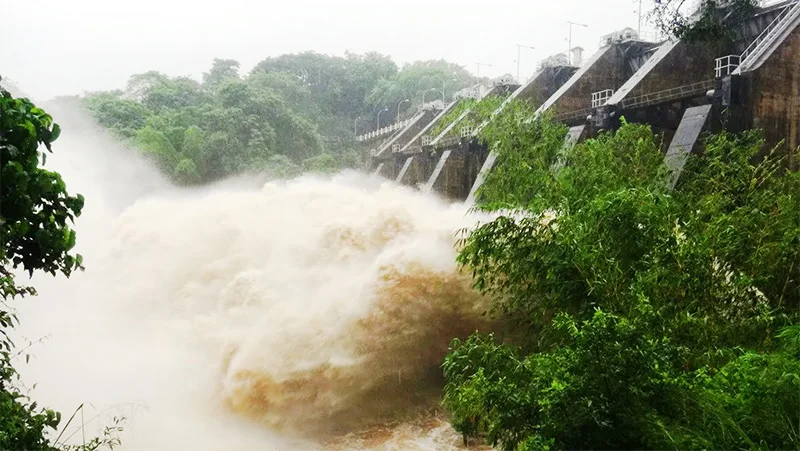
Most reservoirs in Sri Lanka are agriculture and hydropower dominated. Reservoir operators are often unwilling to acknowledge the flood detention capability of major reservoirs during the onset of monsoons. Deviating from the traditional priority for food production and hydropower development, it is time to reorient the operational approach of major reservoir operators under extreme events, where flood control becomes a vital function. While admitting that total elimination of flood impacts is not technically feasible, the impacts can be reduced by the efficient operation of reservoirs and effective early warning systems.
At the very outset, I would like to mention that the contents in this article are based on my personal experience in the Irrigation Department (ID), and there is no intention to disrespect their contributions during the most recent flood event. The objective is to improve the efficiency and the capability of the human resources available in the ID and other relevant institutions to better respond to future flood disasters.
Reservoir operation and flood forecasting
Reservoir management is an important aspect of water management, as water storage and release are crucial for managing floods and droughts. Several numerical models and guidelines have already been introduced to the ID and MASL during numerous training programs for reservoir management and forecasting of inflows.
This article highlights expectations of engineering professionals and discusses a framework for predicting reservoir inflows from its catchment by using the measured rainfall during the previous few days. Crucially, opening the reservoir gates must be timed to match the estimated inflow.
Similarly, rainfall-runoff relationships had been demonstrated and necessary training was provided to selected engineers during the past to make a quantitative (not qualitative) forecast of river water levels at downstream locations, based on the observed rainfall in the upstream catchment.
Already available information and technology
Furthermore, this article highlights the already available technology and addresses certain misinformation provided to the mass media by some professionals during recent discussions. These discrepancies are primarily related to the opening of reservoir gates and flood forecasting.
A. Assessing the 2025 Flood Magnitude
It is not logically sound to claim that the 2025 flood in the Kelani basin was the highest flood experienced historically. While, in terms of flood damage, it was probably the worst flood experienced due to rapid urbanisation in the lower Kelani basin. We have experienced many critical and dangerous floods in the past by hydraulic definition in the Kelani Ganga.
Historical water levels recorded at the Nagalagam Street gauge illustrate this point: (See Table)

In view of the above data, the highest water level recorded at the Nagalagam river gauge during the 2025 flood was 8.5 ft. This was a major flood, but not a critical or dangerous flood by definition.
B. Adherence to Reservoir Standing Orders
According to the standing orders of the ID, water levels in major reservoirs must be kept below the Full Supply Level (FSL) during the Northeast (NE) monsoon season (from October to March) until the end of December. According to my recollection, this operational height is 1.0m below the FSL. Therefore, maintaining a reservoir below the FSL during this period is not a new practice; it explicitly serves the dual purpose of dam safety and flood detention for the downstream areas.
C. Gate Operation Methodology
When a reservoir is reaching the FSL, the daily operation of gates is expected to be managed so that the inflow of water from the catchment rainfall is equal to the outflow through the spill gates (Inflow * Outflow). The methodology for estimating both the catchment inflow and the gate outflow is based on very simple formulas, which have been previously taught to the technical officers and engineers engaged in field operations.
D. Advanced Forecasting Capabilities
Sophisticated numerical models for rainfall-runoff relationships are available and known to subject specialists of the ID through the training provided over the last 40 years. For major reservoirs, the engineers in charge of field operations could be trained to estimate daily inflows to the reservoirs, especially in cases where the simple formulas mentioned in section C are not adequate.
Design concept of reservoir flood gates
Regarding the provision of reservoir spill gates, one must be mindful of the underlying principles of probability. Major reservoir spillways are designed for very high return periods, such as 1,000 and 10,000 years. If the spillway gates are opened fully when a reservoir is at full capacity, this can produce an artificial flood of a very large magnitude. A flood of such magnitude cannot occur under natural conditions. Therefore, reservoir operators must be mindful in this regard to avoid any artificial flood creation.
In reality, reservoir spillways are often designed for the sole safety of the reservoir structure, often compromising the safety of the downstream population. This design concept was promoted by foreign funding agencies in recent times to safeguard their investment for dams. Consequently, the discharge capacities of these spill gates significantly exceed the natural carrying capacity of river downstream. This design criterion requires serious consideration by future designers and policymakers.
Undesirable gate openings
The public often asks a basic question regarding flood hazards in a river system with reservoirs: Why is flooding more prominent downstream of reservoirs compared to the period before they were built? This concern is justifiable based on the following incidents.
For instance, why do Magama in Tissamaharama face flood threats after the construction of the massive Kirindi Oya reservoir? Similarly, why does Ambalantota flood after the construction of Udawalawe Reservoir? Furthermore, why is Molkawa in the Kalutara District area getting flooded so often after the construction of Kukule reservoir?
These situations exist in several other river basins too. Engineers must therefore be mindful of the need to strictly control the operation of reservoir gates by their field staff. The actual field situation can sometimes deviate significantly from the theoretical technology discussed in air- conditioned rooms. Due to this potential discrepancy, it is necessary to examine whether gate operators are strictly adhering to the operational guidelines, as gate operation currently relies too much on the discretion of the operator at the site.
In 2003, there was severe flood damage below Kaudulla reservoir in Polonnaruwa. I was instructed to find out the reason for this flooding by the then Minister of Mahaweli & Irrigation. During my field inspection, I found that the daily rainfall in the area had not exceeded 100mm, yet the downstream flood damage was unbelievable. I was certain that 100mm of rainfall could not create a flood of that magnitude. Further examination suggested that this was not a natural flood, but was created by the excessive release of water from the radial gates of the Kaudulla reservoir. There are several other similar incidents and those are beyond the space available for this document.
Revival of Innovative systems
It may be surprising to note the high quality of real-time flood forecasts issued by the ID for the Kelani River in the late 1980s and early 1990s. This was achieved despite the lack of modern computational skills and advanced communication systems. At that time, for instance, mobile phones were non-existent. Forecasts were issued primarily via the Sri Lanka Broadcasting Corporation (SLBC )in news bulletins.
A few examples of flood warning issued during the past available in official records of the ID are given below:
Forecast issued at 6th June 1989 at 5.00 PM
“The water level at Nagalagam street river gauge was at 9 ft 0 inches at 5.0 PM. This is 1.0 ft above the major flood level. Water level is likely to rise further, but not likely to endanger the Kelani flood bund”.
Eng. NGR. De Silva, Director Irrigation
Forecast issued at 30th Oct 1991 at 6.00 PM
“The water level at Nagalagam street river gauge was at 3 ft 3 inches at 6.0 PM. The water level likely to rise further during the next 24 hours, but will not exceed 5.0 ft.”
Eng. K.Yoganathan, Director Irrigation
Forecast issued at 6th June 1993 at 10.00 AM:
“The water level at Nagalagam street river gauge was at 4 ft 6 inches last night. The water level will not go above 5.0 ft within the next 24 hours.”
Eng. K.Yoganathan, Director Irrigation
Forecast issued at 8th June 1993 at 9.00 AM:
“The water level at Nagalagam Street River gauge was at 4 ft 6 inches at 7.00 AM. The water level will remain above 4.0 ft for the next 12 hours and this level will go below 4.0 ft in the night.
The water level is not expected to rise within next 24 hours.”
Eng.WNM Boteju,Director of Irrigation
Conclusion
Had this technology been consistently and effectively adopted, we could have significantly reduced the number of deaths and mitigated the unprecedented damage to our national infrastructure. The critical question then arises: Why is this known, established flood forecasting technology, already demonstrated by Sri Lankan authorities, not being put into practice during recent disasters? I will leave the answer to this question for social scientists, administrators and politicians in Sri Lanka.
Features
Rebuilding Sri Lanka for the long term
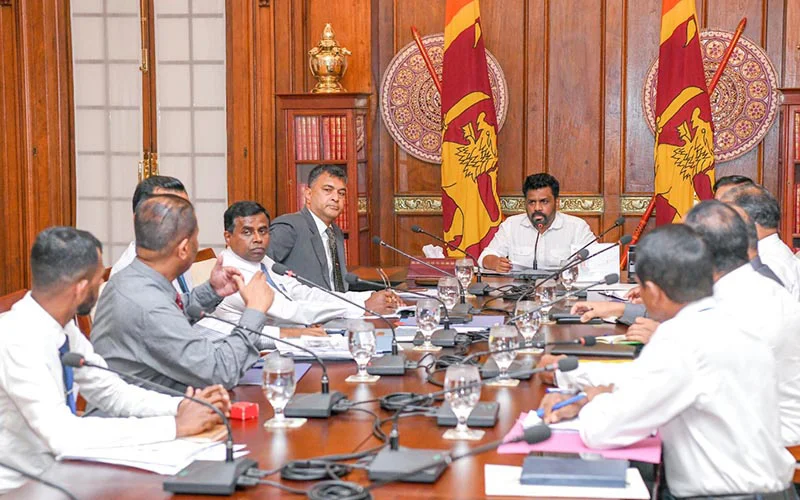
The government is rebuilding the cyclone-devastated lives, livelihoods and infrastructure in the country after the immense destruction caused by Cyclone Ditwah. President Anura Kumara Dissanayake has been providing exceptional leadership by going into the cyclone affected communities in person, to mingle directly with the people there and to offer encouragement and hope to them. A President who can be in the midst of people when they are suffering and in sorrow is a true leader. In a political culture where leaders have often been distant from the everyday hardships of ordinary people, this visible presence would have a reassuring psychological effect.
The international community appears to be comfortable with the government and has been united in giving it immediate support. Whether it be Indian and US helicopters that provided essential airlift capacity or cargo loads of relief material that have come from numerous countries, or funds raised from the people of tiny Maldives, the support has given Sri Lankans the sense of being a part of the world family. The speed and breadth of this response has contrasted sharply with the isolation Sri Lanka experienced during some of the darker moments of its recent past.
There is no better indicator of the international goodwill to Sri Lanka as in the personal donations for emergency relief that have been made by members of the diplomatic corps in Sri Lanka. Such gestures go beyond formal diplomacy and suggest a degree of personal confidence in the direction in which the country is moving. The office of the UN representative in Sri Lanka has now taken the initiative to launch a campaign for longer term support, signalling that emergency assistance can be a bridge to sustained engagement rather than a one-off intervention.
Balanced Statement
In a world that has turned increasingly to looking after narrow national interests rather than broad common interests, Sri Lanka appears to have found a way to obtain the support of all countries. It has received support from countries that are openly rivals to each other. This rare convergence reflects a perception that Sri Lanka is not seeking to play one power against another, and balancing them, but rather to rebuild itself on the basis of stability, inclusiveness and responsible governance.
An excerpt from an interview that President Dissanayake gave to the US based Newsweek magazine is worth reproducing. In just one paragraph he has summed up Sri Lankan foreign policy that can last the test of time. A question Newsweek put to the president was: “Sri Lanka sits at the crossroads of Chinese built infrastructure, Indian regional influence and US economic leverage. To what extent does Sri Lanka truly retain strategic autonomy, and how do you balance these relationships?”
The president replied: “India is Sri Lanka’s closest neighbour, separated by about 24 km of ocean. We have a civilisational connection with India. There is hardly any aspect of life in Sri Lanka that is not connected to India in some way or another. India has been the first responder whenever Sri Lanka has faced difficulty. India is also our largest trading partner, our largest source of tourism and a significant investor in Sri Lanka. China is also a close and strategic partner. We have a long historic relationship—both at the state level and at a political party level. Our trade, investment and infrastructure partnership is very strong. The United States and Sri Lanka also have deep and multifaceted ties. The US is our largest market. We also have shared democratic values and a commitment to a rules-based order. We don’t look at our relations with these important countries as balancing. Each of our relationships is important to us. We work with everyone, but always with a single purpose – a better world for Sri Lankans, in a better world for all.”
Wider Issues
The President’s articulation of foreign relations, especially the underlying theme of working with everyone for the wellbeing of all, resonates strongly in the context of the present crisis. The willingness of all major partners to assist Sri Lanka simultaneously suggests that goodwill generated through effective disaster response can translate into broader political and diplomatic space. Within the country, the government has been successful in calling for and in obtaining the support of civil society which has an ethos of filling in gaps by seeking the inclusion of marginalised groups and communities who may be left out of the mainstream of development.
Civil society organisations have historically played a crucial role in Sri Lanka during times of crisis, often reaching communities that state institutions struggle to access. Following a meeting with CSOs, at which the president requested their support and assured them of their freedom to choose, the CSOs mobilised in all flood affected parts of the country, many of them as part of a CSO Collective for Emergency Response. An important initiative was to undertake the task of ascertaining the needs of the cyclone affected people. Volunteers from a number of civil society groups fanned out throughout the country to collect the necessary information. This effort helped to ground relief efforts in real needs rather than assumptions, reducing duplication and ensuring that assistance reached those most affected.
The priority that the government is currently having to give to post-cyclone rebuilding must not distract it from giving priority attention to dealing with postwar issues. The government has the ability and value-system to resolve other national problems. Resolving issues of post disaster rebuilding in the aftermath of the cyclone have commonalities in relation to the civil war that ended in 2009. The failure of successive governments to address those issues has prompted the international community to continuously question and find fault with Sri Lanka at the UN. This history has weighed heavily on Sri Lanka’s international standing and has limited its ability to fully leverage external support.
Required Urgency
At a time when the international community is demonstrating enormous goodwill to Sri Lanka, the lessons learnt from their own experiences, and the encouraging support they are giving Sri Lanka at present, can and must be utilised. The government under President Dissanayake has committed to a non-racist Sri Lanka in which all citizens will be treated equally. The experience of other countries, such as the UK, India, Switzerland, Canada and South Africa show that problems between ethnic communities also require inter community power sharing in the form of devolution of power. Countries that have succeeded in reconciling diversity with unity have done so by embedding inclusion into governance structures rather than treating it as a temporary concession.
Sri Lanka’s present moment of international goodwill provides a rare opening to learn from these experiences with the encouragement and support of its partners, including civil society which has shown its readiness to join hands with the government in working for the people’s wellbeing. The unresolved problems of land resettlement, compensation for lost lives and homes, finding the truth about missing persons continue to weigh heavily on the minds and psyche of people in the former war zones of the north and east even as they do so for the more recent victims of the cyclone.
Unresolved grievances do not disappear with time. They resurface periodically, often in moments of political transition or social stress, undermining national cohesion. The government needs to ensure sustainable solutions not only to climate related development, but also to ethnic peace and national reconciliation. The government needs to bring together the urgency of disaster recovery with the long-postponed task of political reform as done in the Indonesian province of Aceh in the aftermath of the 2004 tsunami for which it needs bipartisan political support. Doing so could transform a national tragedy into a turning point for long lasting unity and economic take-off.
by Jehan Perera
-

 Business6 days ago
Business6 days agoCabinet approves establishment of two 50 MW wind power stations in Mullikulum, Mannar region
-
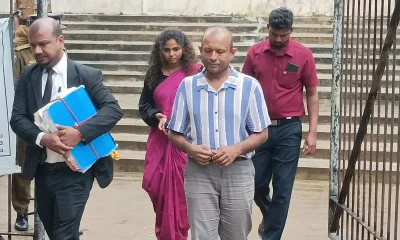
 News7 days ago
News7 days agoGota ordered to give court evidence of life threats
-

 Features7 days ago
Features7 days agoCliff and Hank recreate golden era of ‘The Young Ones’
-
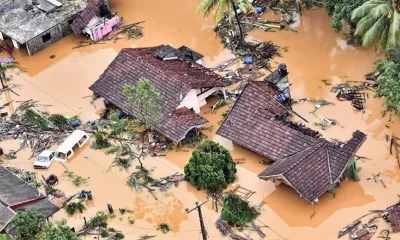
 Features7 days ago
Features7 days agoSri Lanka and Global Climate Emergency: Lessons of Cyclone Ditwah
-

 Editorial7 days ago
Editorial7 days agoExperience vs. Inexperience
-

 Features4 days ago
Features4 days agoWhy Sri Lanka Still Has No Doppler Radar – and Who Should Be Held Accountable
-
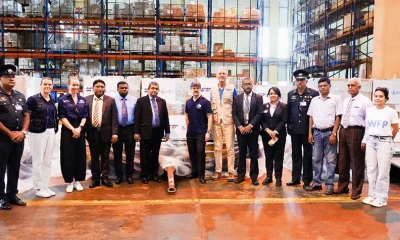
 News7 days ago
News7 days agoWFP scales up its emergency response in Sri Lanka
-

 Features6 days ago
Features6 days agoDitwah: A Country Tested, A People United








